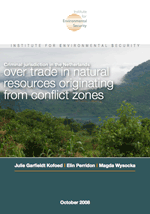Criminal Jurisdiction in the Netherlands over Trade in Natural Resources Originating from Conflict Zones

Natural resources such as diamonds, timber, coltan, and other minerals are often extracted from developing countries by rebel groups; and the resources are subsequently exported to developed countries as private goods. There is evidence that the presence of valuable natural resources increases the likelihood of armed conflict; and it is widely acknowledged that the sale of these natural resources is often used to fund an prolong armed conflicts. Once sold, these natural resources regularly enter developed countries, including the Netherlands, as a final destination or a transit point, whereupon they are sold and used as if they were legitimately obtained goods.
Given that the countries of origin are often unable to exercise effective control over the illicit extraction and trade in resources on their territory, the IES has advocated that developed importing or transit countries take steps to block access to their national markets by criminalizing trade in resources that originate from conflict zones and that are illicitly extracted and sold. It is hoped that the prevention of access to the external market will diminish the money flow which fuels armed conflicts. It is expected that without the ability to export the illicitly obtained resources to external markets, the most important money flows that underlie or fund the continuation of armed conflict will soon dry up.
Publication website ( PDF - www.envirosecurity.org )
| Author(s) | Julie Garfieldt Kofoed, Elin Perridon, Magda Wysocka |
| Publisher | Institute for Environmental Security |
| Place published | Amsterdam |
| Date / Journal Vol No. | |
| Pages | 64 |
Related Organisations
Themes
6 - Environmental conflict prevention and resolution
Subjects
CNP Conflict Prevention
LAW Law / Justice
NTR Natural Resources